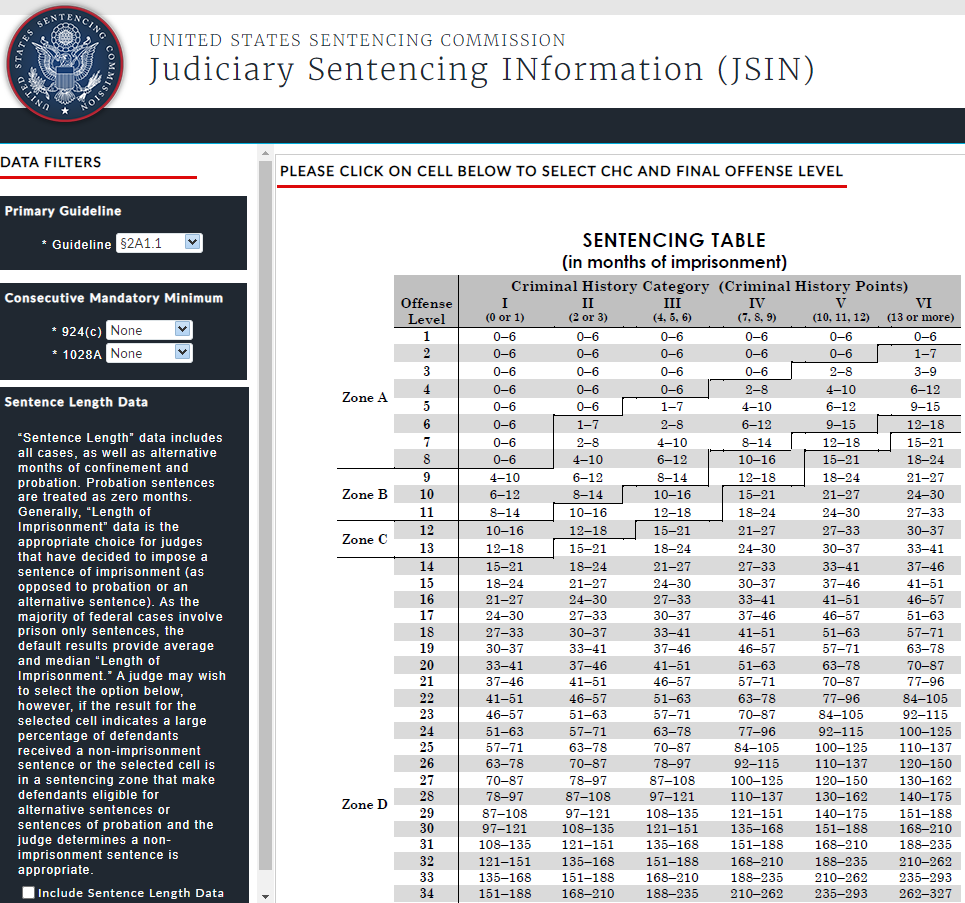LEGAL REPRESENTATION IS NEEDED – BUT JUSTICE MOVES SLOWLY
Should your client be denied medical care once they have either self-surrendered, been remanded, or are still incarcerated, do they know what to do? Was their medical background comprehensive when provided to their Probation Officer? While this hopefully is a rare occurrence, it does happen, as you have read in recent cases.
The Federal Bureau of Prisons Track Record of Providing Medical Care – When It’s Needed
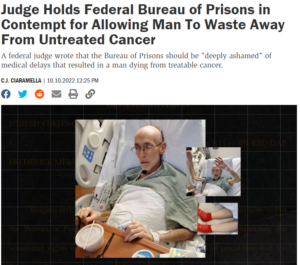
October 10, 2022, Judge[i] Holds Federal Bureau of Prisons in Contempt for Allowing Man To Waste Away From Untreated Cancer[ii]
- In November 2020, Bardell filed a motion[iii] requesting a Compassionate Release. He followed up with a Second Motion in February 2021[iv], accompanied by an Affidavit from an Oncologist. Despite the government’s opposition, Judge Dalton ordered Bardella’s release, expressing disgust at the situation.
- However, upon his release, The BOP brought Bardell in his wheelchair to the Dallas/Fort Worth airport in a van, only to drop him off without his wheelchair, bleeding and soiling himself.

September 23, 2023, 1 IN 4 INMATE DEATHS HAPPENED IN THE SAME PRISON. WHY?
- …a 47-year-old with a family history of breast cancer discovered lumps in her left breast while in federal prison. Treatment was denied until it was too late to treat – a judge released her on compassionate release.
- …a 70-year-old was denied care for so long that he lost an eye, and a judge released him on compassionate release.
- …for 7 months, another begged to see a doctor until it was too late, and he died of cancer.
- …a 50-year-old male complaining of headaches, but the doctors said he was faking it, was eventually diagnosed with a cancer tumor the size of an egg and died.
March, 2023, The New England Journal of Medicine,[v]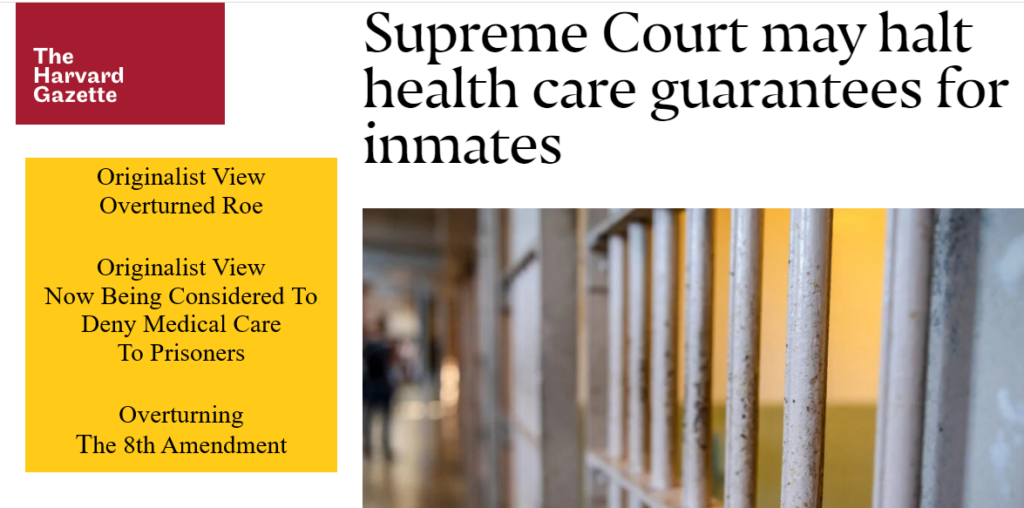
On a deeper dive into the availability of medical care in prisons, there is a real possibility that the minimum standard for inmate healthcare, which was established in 1976 by a Supreme Court ruling, could be Stopped-Overturned, using the same legal framework that caused the Overturning of Roe v. Wade in June.
- Deliberately withholding treatment from prisoners with serious medical needs is considered “Cruel and Unusual Punishment⚖️” under the Constitution’s Eighth Amendment.
ADVOCATING FOR MEDICAL CARE WHEN IT’S DENIED: The SEICHE Center for ‘Health and Justice’, Between Yale’s School of Medicine and Law School,“My dad was ill. Could he survive the prison health-care system?”
- Family members stay engaged, like when kids are still close to their moms or dads who are incarcerated,
- When there is a family support system when people return home or even when they’re inside, that
- That the health of the incarcerated person is better,” –Professor Emily Wang, MD, MAS.
- Admin Remedy
- Compassionate Release (Recently passed Amendments),
- Second Look Act,
- the Media,
- Congressional representatives, and never giving up by constantly calling and advocating.
Call 240.888.7778 for a personal one-on-one call
to discuss your current issue or that of a loved one.-Marc Blatstein
WHAT YOU CAN DO WHEN PRISONS (FEDERAL) FAIL  TO PROVIDE MEDICAL CARE.
TO PROVIDE MEDICAL CARE.
THE INMATE’S GUIDE TO ADMINISTRATIVE REMEDY REQUESTS IN FEDERAL PRISONS
BOP REGULATIONS (P1330.18)
FOR THE PATIENT/INMATE | LOVED ONES | AND THOSE WITH POWER OF ATTORNEY
Below, I review several methods for clients, now patients/inmates, to advocate for themselves and additional options for their loved ones, family members, and those with Power of Attorney.
This does not replace the need for Legal Representation. While the Eighth Amendment and BOP Regulations [P6031.04 Patient Care] state that medical care will be provided, its availability is sometimes in question. If a BOP Second Opinion Consult is granted, sometimes months to years later, allowed – the local prison Clinical Director is not required to implement those treatment recommendations (Program Statement P6031.04 (Pg. 20-21), that could keep the patient/inmate’s care “Within The Standard of Care” in their community.
Unfortunately, the cases provided are current examples (as of 10/2023). The only proactive step one can take is to provide an accurate and comprehensive background that includes any medical issues they may have. Once included in their Personal NARRATIVE and provided 1-2 weeks before the Presentence Interview to their Probation Officer, it increases the chances of it being included in their official Presentence Report.
- Should, on a rare occasion, a medical issue arise before the PSI where the current treating physician feels that the BOP (taking into account staffing issues in the BOP in general or at their Federal Medical Centers, or for other medical reasons), other actions may be indicated.
- According to the BOP Policy, the court cannot order the BOP to provide specific medications, which may include treatments; BOP National Formulary Part I, 2022. Page 4, #9. Further, they appear to recommend consulting with BOP Counsel for that Region – so does it make sense to get their input before sentencing rather than after incarceration?
Ensure your client knows the dos and don’ts of the environment they’re about to enter – for it’s another world with a different set of rules.
 HOUR ONE – IS AN EMOTIONAL SHOCK
HOUR ONE – IS AN EMOTIONAL SHOCKUnderstanding the importance of the Administrative Remedy is just a part of the Preparation and Knowledge Process. Knowing what to expect in prison – before their first day contributes to reducing the fears they and their loved ones naturally are going through. Having been through this, please prepare them because it will benefit them in many ways.
Realizing that there are no guarantees, preparation provides them with the information needed to stay out of trouble as well as how to navigate and work to gain the maximum benefit from the First Step Act Programs (should there be enough support staff), RDAP, Second Chance Pell Grants for College Courses, and overall work on their personal development. All of this is helpful as they approach their early release date.
Not being personally prepared (I was also not a great client, as I was that deer in headlights) was a driving force that allowed me to be here with you today. Yes, I had a felony in 2006, but with colleagues’ support, my practice license was reinstated in 2010.
Transitioning from patient care to preparing those facing their life-altering event is my way to give back and is self-rewarding in its own right – a worthwhile career change.
I) MEDICAL CARE DENIED; ACTION STEPS THE PATIENT/INMATE CAN TAKE.
The Administrative Remedy P1330.18 Program Statement[vii]( ‘Factsheet’) – If the Person Is Capable and Has Their Strength.
These Steps consist of the,
- BP: 8 (or Cop-Out), 9, 10, and 11[viii]. – what they look like, followed by
- Title 28 USSC § 2241[ix],
- The Pro Se Motion (Form) is what you send to your Federal District Court.
- The Bureau of Prisons (BOP) encourages inmates to utilize the Administrative Remedy Process to address grievances.
- It is advised that the patient/inmate maintain an accurate written timeline of events on a calendar and
- Please keep four copies (and the original) of all relevant documentation for future reference. This practice will help keep track of important details and ensure all necessary information is readily available.
- Use email when available.
- ONLY ‘1’ COMPLAINT PER ADMINISTRATIVE REMEDY REQUEST IS ALLOWED, AND EACH BP 8, 9, 10, 11, AND 2241 MUST HAVE THE SAME COMPLAINT.
The patient/inmate is to include copies of all previously submitted documents in their current complaint, with Minimal need for changes in wording.
Keep 4 copies of all original documents for future use.
- Take copies of everything and keep the originals.
- Ensure to document all pertinent information about the incident, including the specific Day, Date to whom you Have Spoken, and The Time → of The Incident.
- Not the date you are writing or filling out this form.
- You’re expected to try and resolve the matter through a simple conversation with your counselor or (case manager), the BP-8.
- ON EACH BP 8, 9, 10 and 11,
Include;
(1) THE DATE OF THE INCIDENT IN YOUR BP-8,
(2) THE NAME of the individual(s) with whom you spoke,
(3) WHY YOUR REQUEST is being made, and
(4) WHAT YOU’RE ASKING FOR.
Each facility has its own rules. To start the process, speak with your counselor (BP-8) first to learn how their process works.
- When the counselor responds, remember what they tell you – with attention to detail, write your notes later and note the conversation’s date, content, and time.
- Once the counselor explains the process, follow the process strictly. Write the date that the incident“Happened,” not when you filled out the form – unless it’s the same date.
Supplies to get started;
- If you can access a copy machine, make 4 copies of everything (possibly in the library). You may need a pen, tablet with paper, envelopes, and likely stamps. If there is no copy machine, you can handwrite 4 copies of everything – written precisely the same to be used on future BP Forms if needed.
- A Calendar is critical.
- With No Response or Negative Responses – Keep Track of the Days For Each BP 8, 9, 10, and 11.
Deadlines are also critical; the BOP staff may be Late. You are not given that same grace period; if you are late, the staff may reject the complaint because the time to complain has expired.
- Write down the day the incident happened.
- Write down the day you made the informal complaint (which has to be within 20 days of the incident – or Sooner).
Although a person in prison must adhere to the deadline of [“#”] days, staff members are not required to respond, nor do they have to respond.
- Nevertheless, you must show that you attempted to resolve the matter with an informal complaint.
Writing A Letter Can Substitute for a BP- 8, 9, 10, or 11.
If there is no counselor available, you should record that the counselor is unavailable and then write a letter requesting that;
- The Warden treated the letter as a BP-9, Administrative Remedy Appeal, or
- The Regional Director treated the letter as a BP-10, Administrative Remedy Appeal, or
- The Central Office treats the letter as a BP-11, Administrative Remedy Appeal.
START Each BP with the date and time of your original informal complaint (BP-8, attached), then (BP-9, attached), etc.
The date of the 1st incident is located in the BP-8 (but not the Date the BP-8 was Written)
OPTIONS;
- You did not receive a response to your informal complaint. Write that no one responded to your complaint, and you filed the (NEXT BP # and Form IN SEQUENCE) to comply with deadlines.
- If you received an unfavorable response, 1) Reply that you disagree with the decision on the complaint. 2) This is why you’re filing the (NEXT BP # and Form IN SEQUENCE) for a formal administrative remedy request.
- If you’ve missed the deadline to file the formal complaint, you must explain the reason why. 1) For example, if you were sick or locked in the SHU, nobody provided you with a BP form. Do your best to comply with the deadlines because the BOP likes to Deny-Deny-Deny.
END Each BP Form by noting how you are submitting it.
- When submitting the form to the counselor, add or include their name, date, and time.
- If you are putting the form in the unit mailbox, indicate the date and time you put it in the unit mailbox.
- If you are in the SHU and have to submit it to a staff member, write down that person’s name and the date and time you hand the form to them.
WHERE APPROPRIATE, INCLUDE COPIES OF BOP POLICIES AND FORMS that validate your position. These should be available in your library: Medical, Dental, and Health Policy
Include;
(1) THE DATE OF THE INCIDENT IN YOUR BP-8,
(2) THE NAME INDIVIDUAL(S) with whom you spoke,
(3) WHY YOUR REQUEST is being made, and
(4) WHAT YOU’RE ASKING FOR.
THE PROCESS STARTS
…with the “Informal Complaint,” or BP-8, or Cop-Out, that one requests from their Case Manager. At best, this is an informal conversation with your Case Manager to resolve the issue.
With No Response or a Negative Response within 24 hours – The Formal Process Begins. The next day…
The Patient/Inmate Next Requests a BP-9 from their Case Manager, who “Logs” this for the Record. This one goes to The Warden.
- A 20-Day Clock Starts – and keeping track of the Days is Critical – Because if Late, the STAKEHOLDERS May Choose to Use It’s Being Late To Deny Your Request.
- Include copies of everything previously sent (BP-8 or Cop-Out).
- With No Response or a Negative Response within 20 Days
The Patient/Inmate requests a BP-10 from their Case Manager, who “Logs” this for the Record. This one goes to The Regional Director in your Region.
- The 30-Day Clock Starts – and keeping track of the Days is Critical – Because if Late, the STAKEHOLDERS May Choose to use its Being Late To Deny Your Request.
- Include copies of everything previously sent (BP: 8 or Cop-Out, 9).
*Cross-check Regional Directors with the above list and include those names.
Regional Director / Mid-Atlantic Regional Office (Check against BOP List, if different, contact as many as possible.)
1. 10010 Junction Drive, Suite 100-N, Annapolis Junction, Maryland 20701, Certified – Return Receipt.
2. MXR Leadership: Chris Gomez, 302 SENTINEL DRIVE, ANNAPOLIS JUNCTION, MD 20701, MXRO-ExecAssistant@bop.gov, Phone: 301-317-3100, Certified – Return Receipt.
Regional Director / North Central Regional Office (Check against BOP List; if different, contact as many as possible.)
1. NCR Leadership: Andre Matevousian, Gateway Complex Tower II, 400 STATE AVENUE, SUITE 800, KANSAS CITY, KS 66101-2492, Certified – Return Receipt, Email: NCRO-ExecAssistant@bop.gov, Phone: 913-621-3939
Regional Director /Northeast Regional Office (Check against BOP List; if different, contact as many as possible.)
1. NER Leadership: Amy Boncher, S. CUSTOM HOUSE, 7TH FLOOR, PHILADELPHIA, PA 19106, Certified – Return Receipt. Email: NERO-ExecAssistant@bop.gov, Phone: 215-521-7301
Regional Director / South Central Regional Office (Check against BOP List; if different, contact as many as possible.)
1. 4211 Cedar Springs Road, Suite 300, Dallas, Texas 75219, Certified – Return Receipt.
2. SCR Leadership: Heriberto Tellez, US ARMED FORCES RESERVE CMPL, GRAND, PRAIRIE, TX 75051, SCRO-ExecAssistant@bop.gov, Phone: 972-730-8600, Certified – Return Receipt.
Regional Director / Southeast Regional Office (Check against BOP List; if different, contact as many as possible.)
1. SER Leadership: Shannon Phelps, 3800 Camp Creek Parkway, SW/BDG 2000, ATLANTA, GA 30331-6226, Email: SERO-ExecAssistant@bop.gov, Phone: 678-686-1200, Certified – Return Receipt.
Regional Director / Western Regional Office (Check against BOP List; if different, contact as many as possible.)
1. 7950 Dublin Boulevard, 3rd Floor, Dublin, California 94568, Certified – Return Receipt.
2. WXR Leadership: Melissa Rios-Marques, 7338 SHORELINE DRIVE, STOCKTON, CA 95219, Email: WXRO-ExecAssistant@bop.gov, Phone: 209-956-9700, Certified – Return Receipt.
With No Response or a Negative Response within 30 Days
The Patient/Inmate requests a BP-11 from their Case Manager, who “Logs” this for the Record. This one goes to The Office of General Counsel in Washington, DC.
1)The 40-Day Clock Starts – and keeping track of the Days is Critical – Because if Late, the STAKEHOLDERS May Choose to Use It’s Being Late To Deny Your Request.
2)Include copies of everything previously sent (BP: 8 or Cop-Out, 9, 10).
File your BP-11 at the following address: Bureau of Prisons, National Inmate Appeals Administrator (Check against BOP List; if different, contact as many as possible.)
- James Wills, AD/General Counsel, BOP Office of General Counsel, 320 First Street, NW, Washington, DC 20534, (202) 307-3198, Certified – Return Receipt.
- Rear Admiral Chris Bina, BOP Assistant Director, Health Services Division, 320 First Street, NW, Washington, DC 20534, (202) 307-3198, Certified – Return Receipt.
With No Response or a Negative Response within 40 Calendar Days
“The Central Office has 40 calendar days to respond as of the date it is received, which may be extended for An Additional 20 Calendar Days.” (“FBOP Administrative Remedy Program – Washington, D.C.”)
- You can now draft Your Pro Se Motion – Form: Writ of Habeas Corpus Under 28 U.S.C. § 2241 to Your Federal District Court,
- This goes to your Federal District Court. Certified – Return Receipt.
- Include copies of everything previously sent (BP: 8, 9, 10, 11).
IF THE PATIENT/INMATE IS INCAPACITATED🥀 AND NEEDS SOMEONE TO ADVOCATE ON THEIR BEHALF: THEIR LOVED ONES OR SOMEONE WITH POWER OF ATTORNEY
** LEGAL REPRESENTATION IS RECOMMENDED
II. MEDICAL CARE DENIED, ACTION STEPS YOUR LOVED ONES CAN TAKE.
The Administrative Remedy Program Statement ( ‘Factsheet’) – If the Patient/Inmate Is Not Able To Do This, 👉Do the following.
First, 👉Maintain an organized file to keep track of your loved one’s conversations and care, including dates, names, phone numbers, and steps taken.
Request a written detailed description of the issue with contact information for further details. KEEP COPIES OF EVERYTHING.
- You could compose a respectful letter to the warden advocating for your loved one. Certified – Return Receipt.
- Present the facts, describe the issues, suggest possible solutions, and ask for inquiry, communication, and collaboration. Help is what you’re asking for, and you’ll “await” their reply (I look forward to hearing from you).
- If a loved one is in jail and requires medical attention, it is essential to take specific actions to ensure they receive appropriate care.
- Request a written response from the Warden concerning your loved one’s medical condition and proposed treatment plan.
- This will provide valuable insights into their health and the measures being taken to address any medical concerns they may have.
- It’s a good idea to contact your loved one’s treating family doctor for additional support.
- This could prove particularly beneficial if you have concerns regarding their current treatment plan or feel they aren’t receiving adequate care while incarcerated. The doctor could provide you with a letter to attach containing more insight into their condition and suggest ways to ensure they receive optimal care.
- By staying informed and advocating for their medical needs, you can help ensure they get the right care – but no promises.
- You’re creating what I call a Paper Trail, which lets all parties know that someone else is watching.
Send copies of your complaint letter to relevant officials, including the prison’s medical director, but if you cannot contact the prison, there is always a,
- Medical Director, there is always The BOP Assistant Adm. addresses above) and your loved one in prison. Keep all originals for yourself. Check the BOP website and below for addresses.
- Copy everybody.
👉Contact your member of Congress. To find your U.S. congressional representative, visit www.house.gov[xii] and enter your zip code. The name of your member will appear.
- Call your congressional representative’s local office. Ask the staff member to whom you should send your
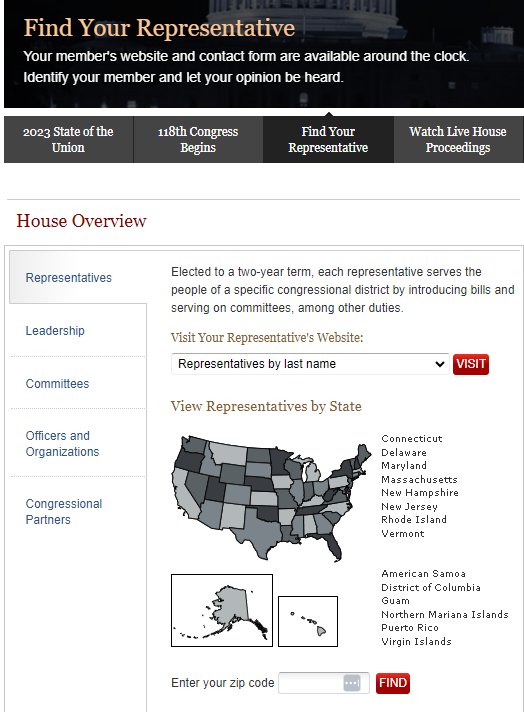 letter.
letter. - Present the problem, stating the facts and your concern.
- Describe the efforts you and your loved one have taken to resolve the problem and ask that your congressional representative investigate the problem.
- Ask your Congressional Representative (or Assistant to ask for you) to write your Warden directly – as you have been told that BOP Wardens pay attention to these emails. Have the Warden’s Name, Phone #, Email, and Address ready, and be specific as to what help you need your representative to ask for, or inquire about.
- Congressional Representatives (you can provide a sample letter, if helpful),
- …from the writer’s district,
- …of the district where the prison is located,
- …office in Washington DC.
- Congressional Representatives (you can provide a sample letter, if helpful),
- Ask your Congressional Representative (or Assistant to ask for you) to write your Warden directly – as you have been told that BOP Wardens pay attention to these emails. Have the Warden’s Name, Phone #, Email, and Address ready, and be specific as to what help you need your representative to ask for, or inquire about.
- Then, follow up with a pre-set phone call, or appointment.
Second. 👉File a Formal Complaint Directly with the Facility and look up the prison contact information.
1) Find Your Prison Warden, or Warden Assistant or secretary,
2) Search for a location:[xiii] Inmates → Find an Inmate, or Locations: List of Our Facilities

3) Include the Patient /Inmate Number and Location
4) You can both call and write respectfully.
- Include that you’re concerned about your loved one’s medical needs and their lack of care, sending a letter to the Warden.
- Attaching a letter from their physician (at home) to provide additional context may be helpful. Certified – Return Receipt.
5) The BOP is a vast government agency. The new BOP Director, Peters, is doing her best to change its culture, so continue your advocating efforts.
Third. 👉If the prison did not resolve your complaint, file a complaint with the Bureau of Prisons (BOP) Regional Office (Above) that oversees the facility.
This goes to the appropriate Region (above)
Include the Patient /Inmate Number and Location
- If you’re concerned about your loved one’s medical needs and the lack of care, consider sending a letter to the Warden.
- Attaching a letter from their physician to provide additional context may be helpful. Certified – Return Receipt.
Fourth. 👉If you cannot address your issue, contact BOP Headquarters or the Department of Justice – Office of the Inspector General.
GO HERE FIRST: To Report a Concern[xiv].
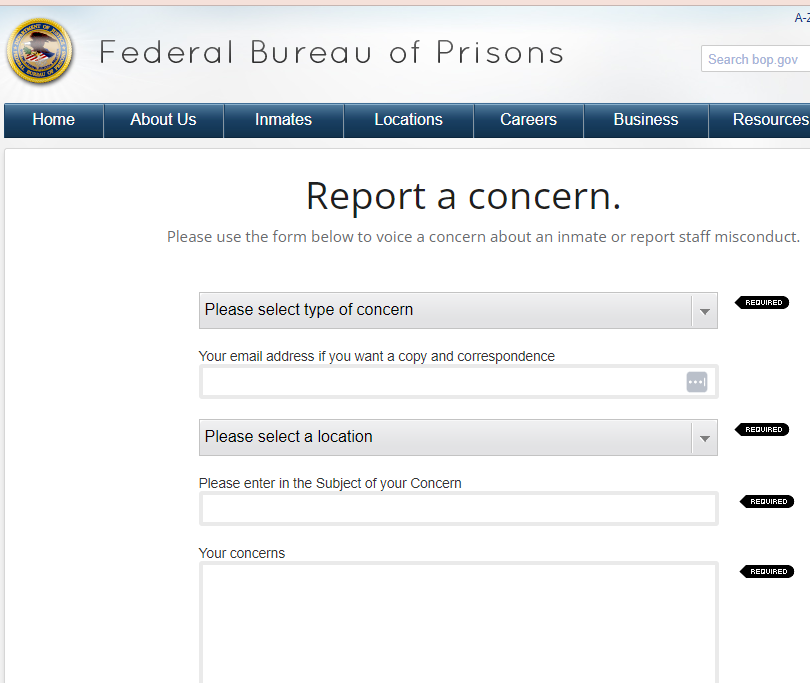
Bureau of Prisons, Headquarters, or the Department of Justice – Office of the Inspector General (2 contacts)
- James Wills, AD/General Counsel, BOP Office of General Counsel, 320 First Street, NW, Washington, DC 20534, (202) 307-3198, Certified – Return Receipt.
- Rear Admiral Chris Bina, BOP Assistant Director, Health Services Division, 320 First Street, NW, Washington, DC 20534, (202) 307-3198, Certified – Return Receipt.
FAMM-VAP-Family-Visit Prison Guide
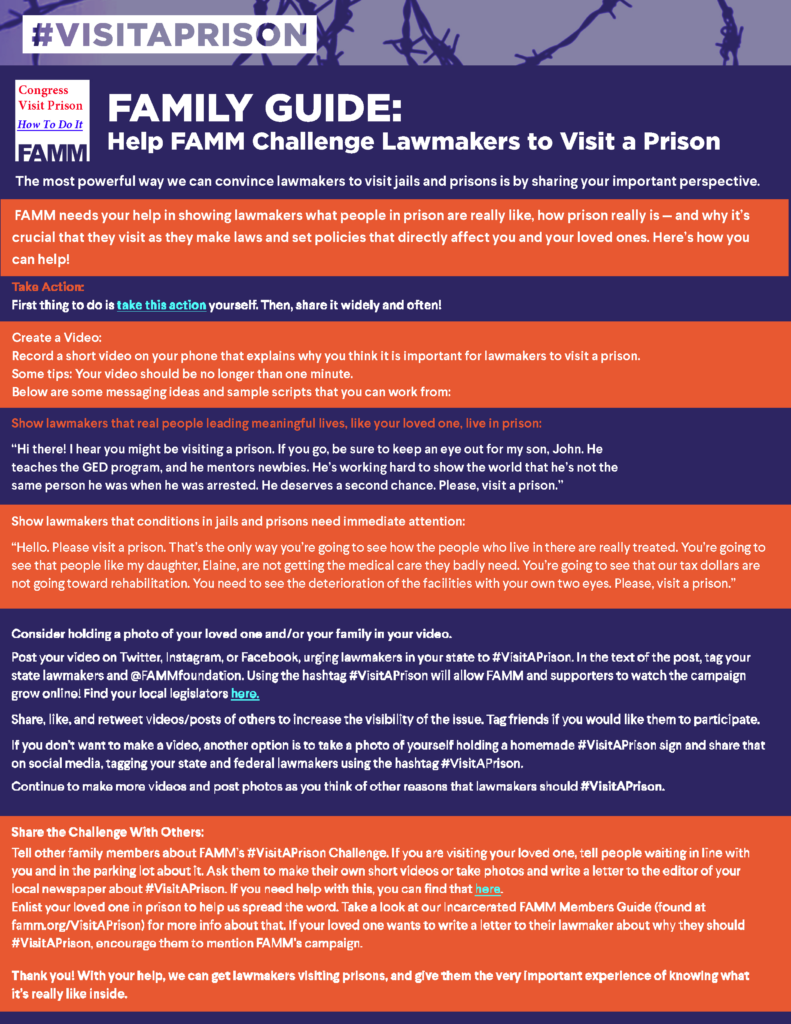
III. WE ALSO HAVE OTHER RESOURCES – CONTACT US
[i] https://reason.com/2022/10/10/judge-holds-federal-bureau-of-prisons-in-contempt-for-allowing-man-to-waste-away-from-untreated-cancer/#:~:text=Bardell%20had%20cancer%E2%80%94let%20alone,and%20instead%20immediately%20released%20Bardell.
[iii] https://storage.courtlistener.com/recap/gov.uscourts.flmd.265888/gov.uscourts.flmd.265888.77.0.pdf
[iv] https://storage.courtlistener.com/recap/gov.uscourts.flmd.265888/gov.uscourts.flmd.265888.86.0.pdf
[v] https://news.harvard.edu/gazette/story/2023/03/supreme-court-may-halt-health-care-guarantees-for-inmates/
[vi] https://www.pprsus.com/wp-content/uploads/2023/09/BOP_-Leadership-2023.pdf
[vii] https://www.pprsus.com/wp-content/uploads/2023/09/1330.18_Administrative-Remedy-2014.pdf
[viii] https://www.pprsus.com/wp-content/uploads/2023/09/NACDL-bp-9-11-forms.pdf
[ix] https://www.law.cornell.edu/uscode/text/28/2241
[x] https://www.pprsus.com/wp-content/uploads/2023/09/Pro-Se-Handbook-Representing-Yourself-in-Federal-Court.pdf
[xi] https://www.pprsus.com/wp-content/uploads/2023/09/Regional-Counsel-and-Consolidated-Legal-Center-Offices.pdf
[xii] https://www.house.gov/
[xiii] https://www.bop.gov/locations/
[xiv] https://www.bop.gov/inmates/concerns.jsp

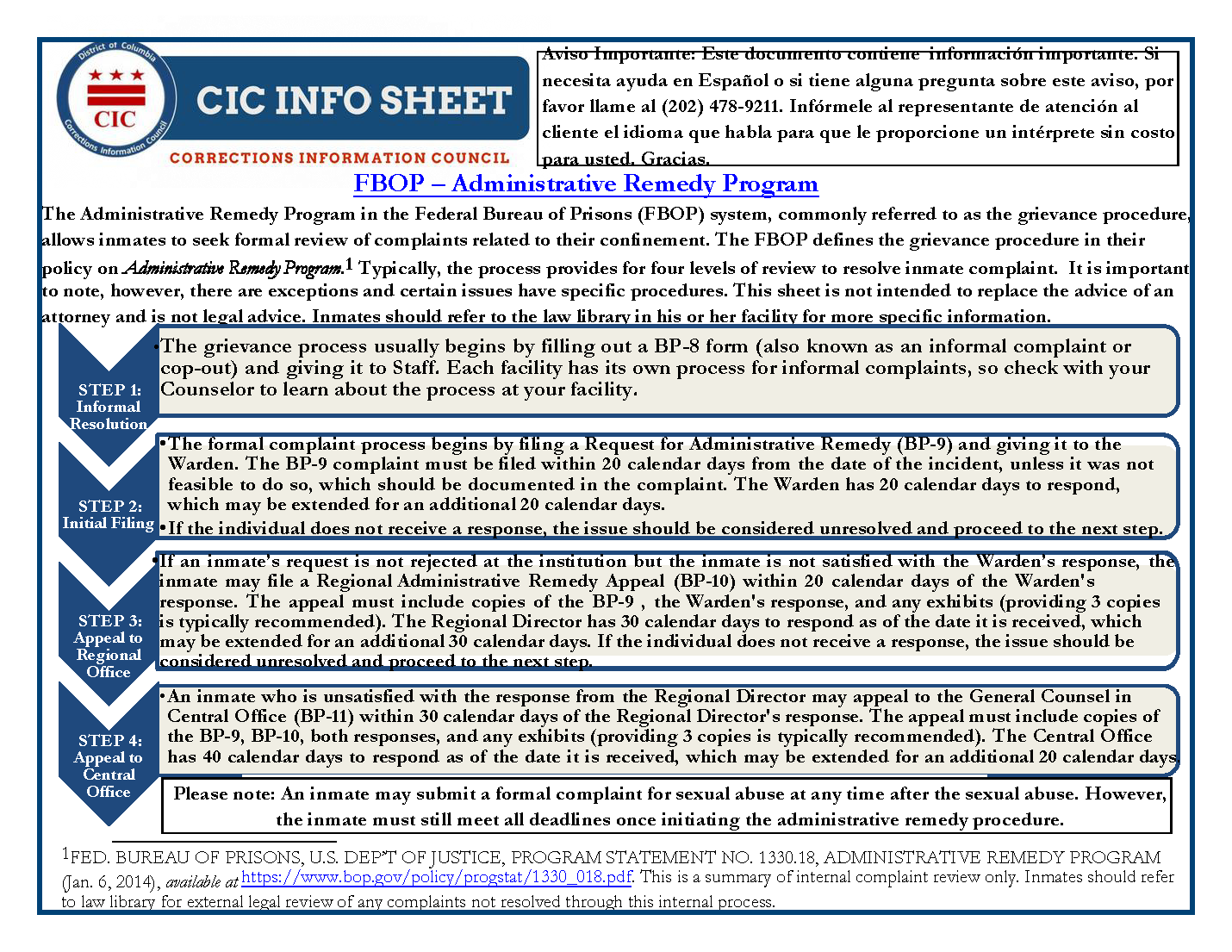


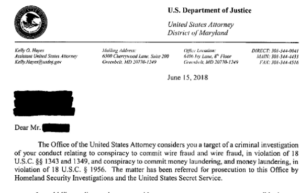
 Release Plan, and your Allocution. Should you feel that you may be too nervous to speak in court, (your conversation with your
Release Plan, and your Allocution. Should you feel that you may be too nervous to speak in court, (your conversation with your 

